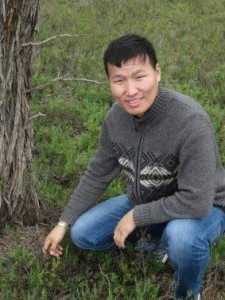Grazing; Arid land ecology; Remote sensing
Contact details:
E-mail: vandandorj@gmail.com
Room 456, D26 Building, UNSW, Kensington 2052
Research Title: The effects of grazing on soils in semiarid woodland
My current research focuses on grazing effects on two key resources in arid environments; soil enzyme activity and water infiltration into soil. Soil enzymes are critical for the cycling and production of nutrients such as carbon, phosphorus, nitrogen and sulphur, and decomposition of organic matter in the ecosystem. Grazing reduces vegetation cover and leads to a decline in the spatial heterogeneity of surface covers such as detached plant material and litter. This reduces the inputs of organic matter and carbon into the soil, leading to reductions in microbial biomass, changes in enzyme activities and soil nutrients.Research interests
The limited number of studies show conflicting results about the response to grazing of specific enzymes and whether they increase or decline with changes in grazing intensity. Trampling by livestock hooves increases soil compaction and reduces the cover of biological crusts, which result in increased erosion and reduced infiltration. Water infiltration is critical for soils in arid ecosystems because water is a major driver of productivity and stability in these systems.
My work will add to the increasing body of knowledge on the risks and benefits of grazing for maintaining key ecosystem processes globally, especially for nations where livestock grazing occurs over extensive areas of drylands.
See also:
https://www.researchgate.net/profile/Sumiya_Vandandorj
Supervisor: Professor David Eldridge
PUBLICATIONS
Vandandorj S, Gantsetseg B, Boldgiv B (2015) Spatial and temporal variability in vegetation cover of Mongolia and its implications. Journal of Arid Land 7: 450-461.
